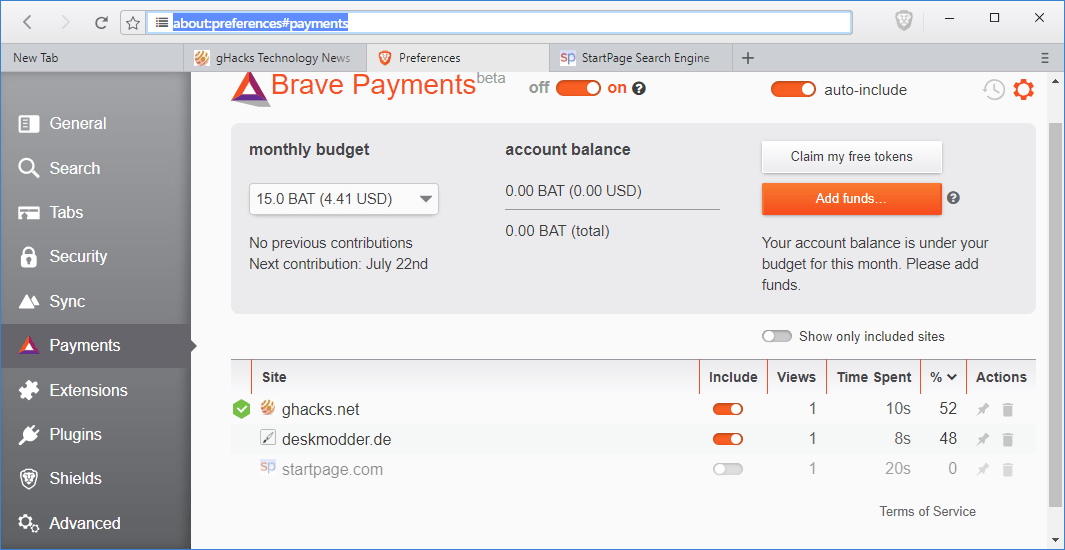Brave starts opt-in Ads trial that rewards users and publishers

Brave, the Chromium-based web browser by former Mozilla CEO Brendan Eich, just entered the next stage of the master plan to change how websites and publishers earn money on the Internet.
One of the key ideas behind Brave was to replace the current advertisement system of the Internet with a better one. Brave wanted to establish its own system that shares the advertisement revenue between publishers, users, and the company.
Brave uses its own currency and platform for that. BAT, Basic Attention Tokens, has been integrated into Brave Payments last year and some users started to use it to distribute BAT to publishers and creators anonymously. Brave funds this currently if you opt-in; this means that you do get a monthly budget of 15 BAT (about 4.41 USD) that you can distribute to websites you visit.
To do that, load about:preferences#payments and use the include toggle to add a site to the distribution pool.
The company announced the start of opt-in advertisement trials yesterday. Users need to leave a comment on the Brave forum and may be selected for the trial when they do.
Brave wants to do things differently in regards to advertisement and the two core difference to the existing advertising model are the following ones:
- Brave pays users about 70% of the gross advertising revenue in BAT. Users can use BAT to reward sites they visit or exchange it for other currency in the future.
- Brave's advertising model values user privacy. Instead of tracking users, it is downloading a set of ads to the user system based on region and language, and displays the most appropriate ad using local matching.
The advertisement option will be opt-in and consent-based according to Brave. Users who don't want to see advertisement don't need to change anything as ads won't be displayed to them.
By moving matching from the ad exchange to the device, Brave ads merge innovation with privacy-by-design and put the user in control. Instead of sending and exposing user data to opaque third parties in cloud-based auctions, Brave’s approach enables a more efficient and direct opportunity to access user attention without the inherent liabilities and risks involved with large scale user data collection.
Brave pushes ad catalogs (one per region and natural language) to available devices on a recurring basis. Downloading a catalog does not identify any user. As the user browses, Brave locally matches the best available ad from the catalog to display that ad at the appropriate time. Brave ads are opt-in and consent-based (disabled by default), and engineered to operate without leaking the user’s personal data from their device.
You can download Brave from the official website.
Closing Words
Brave's success depends on numbers first and foremost in my opinion. I mentioned previously that Ghacks would be self-sufficient if every visitor would pay a few cents monthly and that I would remove all ads immediately in that case. Problem is: most payment types cost money and visitors would have to pay a multiple of the sum they provide for support as fees.
Brave could change that as users can earn the money that they want to give to publishers they like when they browse the Internet. It is also possible to buy BAT and distribute it to all publishers that way.
If Brave reaches a critical threshold it could work (yes I changed my initial stance on Brave).
Now You: What is your take on Brave's approach?






















My worries about BAT is that they intend to become money changers. Brave wants to insert itself between users and websites like VISA has done to money with customers and businesses. Starts out good, but becomes abusive. There are many other very problematic issues too lengthy to address in a comment box, but that one has always stood out to me.
Bizarre. Seems like Brave spent lots of time trying to come up with something better than present, other than subscriptions or product purchases and ended up with an obfuscated version of how advertising works now.
Maybe their user base will participate; I doubt it, you’d have to pay attention to supporting sites in addition to browsing. Their scheme is complicated, maybe it came from ebay or youtube, IDK.
A reminder for those who’ve been around a while :
https://en.wikipedia.org/wiki/AllAdvantage
The Brave solution makes everyone happy. Their main problem is peoples inability to grasp the concept – or Braves inability to communicate it.
“The Brave solution makes everyone happy.”
I think that’s objectively not true. Perhaps you meant to say that you think it *should* make everyone happy?
“The Brave solution makes everyone happy.†Some because they use it, others because they avoid it. Let’s be fair!
“This why we can’t have nice things”…
ANYTHING that involves money lures those types of individuals. How will they combat the inevitable abuse?
Advertisement and Internet. I came across this interesting article which may interest some of us :
Original article :
Internet, terrain de jeu pour les publicitaires (https://www.monde-diplomatique.fr/1997/11/SCHILLER/5003)
Google translated :
Internet, playground for advertisers (https://preview.tinyurl.com/ydeojc3u)
Once you’ve read you wonder perhaps even more than previously (if you ever did) how a browser concept such as Brave can ever be meaningful.
An interesting approach and hopefully it will work out. I think the internet is undergoing a sea change with the new EU directives and more countries imposing their own regulations and filters. Good folks like Martin need a way to make a living on the web and not be beholding to Google or Facebook etc.
Brave may indeed block thousands of ads and trackers but I have to wonder about it’s claim to protecting user privacy when Facebook and Twitter links are displayed on the start page and the default search is Google.
“What is your take on Brave’s approach?”
I’m fine with adblocking, but I’m not at all comfortable with actively replacing ads with other ads. The practice just seems really slimy to me. I’m also not sold on the “BAT” system. I don’t have an objection to it, but I don’t really understand why it’s a good thing.
In any case, Brave has always made me very uncomfortable and it continues to do so, so I won’t be using it.
First, I have to applaud their innovation. I think it’s a good idea and how successful it is will depend a lot on how the final implementation is handled. I’m curious to see how it all works out.
I wish there was some way that they could still send ads to the browser so that those of us using system wide content blockers could see them. If I choose to “Show Brave Ads” my hosts file will block (redirect) them. And it’s great that trackers are being removed but what about javascript? Are they going to be pushing 3rd-party ads? Is anything going to be done to remove the js or at least somehow limit what the js is capable of doing on a user’s system? It’s great that they are trying to limit the data collected by trackers and I appreciate how that improves privacy but my primary concern is Security.
Brave on the desktop, if I’m being honest, isn’t going to be a browser that I will spend any time using. Not at this point. First of all, I very much dislike desktop browsers with built-in content blocking. Sure, it’s probably a good choice for those that just want to stumble around the interwebs without having to give any thought to what’s going on in the background but I need more control.
Using Brave portable I was unable to add any subscription lists, which surprised me because I have no problem adding them to seven other browsers and I’m not feeling the need to do some research to figure out what the malfunction is. Brave doesn’t have an element hider?!? Boo Hiss. ;)
Can’t install Chrome extensions? Sorry, JMO but that is a huge fail. I hate having to use the bookmarks toolbar or the manager to access a bookmark that I want to open but what other choice is there other than CTRL+L? I use the extension “Popup My Bookmarks” that works very well but it’s not an option. Can’t use Privacy Possum, Trace or any other privacy extension. Not too long ago I started using the chrome extension “Font Rendering Enhancer” because of the thinner and lighter appearing fonts in chromium browsers that play hell with my old eyes but I can’t use it in Brave. No access to chrome://flags? That’s disappointing since there are currently a couple dozen very useful flags available.
I truly hope the best for Brave in their future development but right now… I’m just not feeling it.
Sorry, I don’t like ads. Having someone pay me to look at ads sound like an experiment run by a university psych dept. Brave might be good for “impulse” buyers who get a kick out of looking at all kinds of merchandise and services, but when I shop it for something specific. I’ll keep blocking.
However, I have to admit it’s a novel approach.
I agree. Though I wonder if the principle would stand against a higher user income, or not. Receiving, say 20 bucks a month for contemplating fabulous advertisements is far from a good deal, in the same way the percentage gratified to websites for feeding the ad business is unfair. It’s always a problem of distribution. I’d say, 50% for the sites, 40% for the ad publishers, 10% for the consumers : would the principle of refusing to look at ads on that basis stand its chance? Still not as far as I’m concerned. But, zero for looking at decent advertisement, smart, funny, artistic (seldom is but it happens), pertinent, informative, with restriction in their amount, certified malware-free in a globalized anti-tracking network… then I’d say yes, and it’d be for free (“You’re so cute that for you it’ll be free” said the lady to the sailor).
Where can I meet that lady?
@cute sailor, the lady must be over 60 by now so I guess it’d be free for anyone, cute or not :=)
If she hasn’t moved since you might have a look in Toulon, Napoles, Istambul …
Not bad for the first steps, a modern look ans a stable base
What I miss is a plugin like SmartGestures – or compatibility to Chrome-Plugins
There is also a portable Version, better for testing
https://github.com/portapps/brave-portable/releases/latest
It wasn’t clear on their site as to whether this new stage lets users actually earn. Their blog made it sound as BAT can just be passed on to content providers to cash out not for users to cash out.
IIRC payout options are not yet implemented but they will come.
“May I have your (Basic) Attention (Token) please?”. As a theoretical academic analysis, approach and project Brave’s ambition seems to have been weighed and feasible. On the ground I’m far from being convinced it will ever makes its way in that it may concern a few users and a few advertisers but won’t make its way to an ad-user revolutionary relationship. The ad business is far more problematic than its only obstructiveness, we are in a global mixture of ads and malware so-called “malvertisement”, the ad business is not about to reconsider itself in terms of less and better but instead focuses on all means (technological in particular) to force users rather than to seduce them. My opinion is that the scheme is not, cannot be a mutual user-ad handshake but that the business, because of what it factually is, must first practice its auto-critic, respect users, get rid of malware intrusion — in other words clean its place and mind — before anything better be possible.
I’ve been a supporter of Brave right from the start, and I sincerely hope they manage to meet a dent in the market!
It it is an innovative approach, but will it settle down? Also while Brave for Android is very good, for desktop it is cumbersome in my experience. Maybe the upcoming 1.0 version will perform better.
I have actually found that the past couple months of releases to the Brave desktop browser have greatly improved the performance and user experience of the browser. It’s really good now and has become my secondary browser to Firefox. I still run into the occasional issue, but that it to be expected to some degree since its still technically a beta product.
When there be a model that users can earn the money that they want to give to publishers they like when they browse the Internet, is preferable above all other models I guess.
I main opinion there would be also if this model will be introduced also with the restriction that there should be public a cost analysis public checked by an independent accounted where after there could pay a fair amount with a restive upper border. This so that there would be no possibility for fraudulent practices.